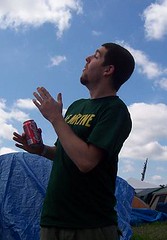About four years ago I bought the Complete Ballad of Halo Jones. Back then I was starving for some trippy, sci-fi action with a leading lady, and this book totally fit the bill. I started reading it, and I really liked it so much that I didn't want it to end; I didn't want to finish it because then it would be over, and I would have nothing left to satiate my desire for sexy-sci-fi. So, halfway through, I put the book on the shelf and intended to read it slowly and enjoy. Well, I never touched it since, until last week, I decided to give it a retry. Starting from the beginning I soon realized that the curious and compelling fascination with the genre had sort of been dispelled over the past four years, and I was no longer attracted to the book for that reason. Lesson learned.
Fortunately The Ballad of Halo Jones, has redeeming qualities far beyond my expectations from those years past, and after I reached the point where my previous bookmark lay, I was found myself enjoying it in a different way.
Halo is written by Alan Moore, who would go on to write V for Vendetta, and of course The Watchmen, a series that is widely regarded as one of the best works ever created in the sequential art medium. HAHA! I use that term in jest, what's wrong with just Comics? I guess maybe they're not all comical... Anyway, in the introduction to this comprehensive edition Moore states, "I didn't want to turn Halo into an action character and thereby deprive the strip of what I thought was its best feature... namely, the sheer ordinariness of its main character." It may seem like a genre convention now: 'ordinary person thrust under extraordinary circumstances' but I've never seen it work better than it does here (in 1984)
The series is connected via three 'books,' each serves to advance the character emotionally in a different way. Book one starts out with Halo leading a mundane life in 'the hoop' which is a floating city off the shores of North America where the lower classes are confined. Halo wishes for something more, but is never quite sure what she wants or how to achieve it. Salvation comes, eventually, in the form of the Clara Pandy, an enormous spaceship/cruise liner. Halo is employed as a hostess, and manages to leave her volatile home behind.
Book two shows Halo's life on the ship, and how she comes to terms with the reality of life as she envisioned it, and the reality of how it actually pans out. A series of traumatic events happen to Halo, and she becomes completely disillusioned with the possibility of hope and happiness.
In Book three, Halo has abandoned the Hostess job, and becomes a drifter of sorts, from planet to planet. We find her in a bar on planet Pwuc. "Under gunmetal skies the planet waited morosely for death. It was not a world that people went to. It was a world where people ended up. In 4960, Halo Jones ended up in Pwuc." Debunked, Halo seems to have fallen into a worse routine than when she lived in the Hoop, only now she has even less aspiration and naivety. She joins the galactic Women's Army, and fights for Earth in the far reaches of space. Book three becomes a war story, and Halo is promoted to a higher rank after a short period of time.
The Ballad of Halo Jones does not have a happy ending. The reader is left unsure how Halo will choose to approach the next stage in her life, and exactly what she has learned from the experience. We are convinced though, that she is capable and independent. I suppose that's the, sort-of, moral to the story; to show how a person can and will undergo many extreme changes in their life, and surely the strong can adapt.
Tuesday, December 19, 2006
Subscribe to:
Post Comments (Atom)


No comments:
Post a Comment